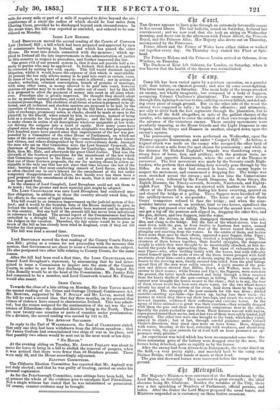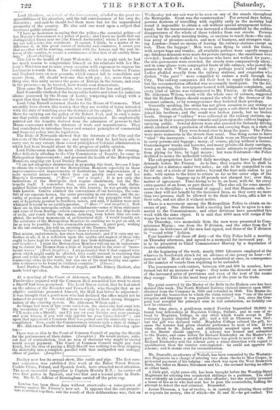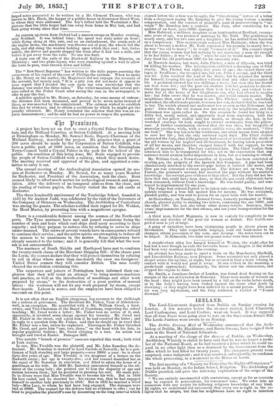t4r Yeittropolio.
Her Majesty's Ministers were entertained at the Mansionhouse by the Lord Mayor, on Saturday. They mustered in great strength; the chief absentee being Mr. Gladstone. Besides the notables of the City, there was a fair sprinkling of Members of Parliament, official persons, and ladies. After the dinner the Lord Mayor proposed the usual toasts, and Ministers responded as is customary on these festive occasions.
Lord Aberdeen, on la half of the CONTI uncut, alluded to the great re- sponsibilities of his situation, and the full consciousness of his own de- ficiencies; and said he should feel them more but for the unparalleled prosperity of the country. He also said one word upon a subject that engrosses public attention.
"I have no hesitation in saying that the policy—the essential policy—of her Majesty's Government is a policy of peace ; and I have no doubt that my distinguished friend near me [the French Ambassador] whom I now have in my eye will realm this sentiment. It cannot, I think, be a matter of in- difference if, in this great centre of industry and commerce, I assure you that no effort will be wanting, consistent with the honour and the real in- terest of the country, to secure a continuance of that first of all earthly bless- ings." (Loud cheering.) This led to the health of Count Walewski ; who in reply said, he had too much reason to congratulate himself on his relations with her Ma- jesty's Ministers not to seize every occasion with eagerness to express his sentiments towards them. The cordiality which exists between France and England rests on new grounds, which cannot fail to consolidate and secure them. All should welcome this with joy ; for, more than any- thing else, this unity secures the peace of Europe in the future, and even in the present,—as, he trusted, facts would soon demonstrate.
Then came the Lord Chancellor, who answered for law and justice. Earl Granville vindicated the businesslike habits and talent for judicious silence possessed by the House of Lords; tempering his eulogy with a regret that they had thrown out the Jew Bill.
Lord John Russell returned thanks for the House of Commons. That assembly have shown this session that they are worthy of being intrusted with the duty of watching over the destinies of the empire. He applauded them for carrying out the policy of Sir Robert Peel, and in such a man- ner that public credit would be inviolably maintained. He emphatically pointed out the benefits derived from the admission of persons to that House conversant with the interests of trade and manufactures. They had contributed to introduce larger and sounder principles of commercial and financial policy into its legislation.
The Duke of Newcastle showed that the interests of the City and the interests of the Colonies are one ; and rejoiced that he had been able to carry out, to any extent, those sound principles of Colonial administration which had been brought about by the progress of public opinion.
Lord Palmerston made the most characteristic speech of the evening. After delicately alluding to the City Commission of Inquiry, he came to Metropolitan improvements ; and proposed the health of the Metropolitan Members, singling out Lord Dudley Stuart.
"I am not altogether disinterested in proposing this toast, because I hope to obtain the ecoperation of the Metropolitan Members especially in those improvements—not improvements of institutions, but improvements of a more material nature—in which they can greatly assist me and her Majesty's Government. ("Hear!" and a laugh.) lt is not only the institutions of the Metropolis that require amendment, but the Me- . tropolis itself. I remember that, some years ago, when the distin- guished Italian sculptor Canova was in this country, he was greatly struck wh London. Canova admired the convenience of our footways, the com- fort of our separate houses, the order prevailing in our streets, and the se- curity of persons and of property, and concluded his panegyric with that sort .of h3perbole peculiar to Southern minds, and said, if London were only whitened it would be an earthly paradise. (" Hear !" and laughter.) Now -there 'are in this metropolis certain establishments—some of them stationary and some of them floating—which consume every hour of the day ship-loads of coals, and vomit forth the smoke, defacing, even before they are com- pleted, the noblest monuments of architectural skill. I would humbly ask the assistance of the Metropolitan Members in enabling me to put an end, so far as may be possible, to this abominable nuisance. A great poet, writing in the last century, has told us, speaking of the Thames, that 'Its translucent wares shone a broad mirror.'
That mirror, unfortunately, has since been darkened ; and if it casts any re- flection at all, it is a reflection upon the apathy and neglect of those who ought to have kept its waters clear and free from defilement. ("Ilear !" and laughter.) I trust the Metropolitan Members will aid me in endeavour- ing to restore the Thames from a state of liquid mud to the state of trans- lucent waves.' Witch laughter.) I am persuaded that if that support were given which might easily be afforded, they could succeed in rendering this great and noble city not merely one of the wealthiest and most important commercial cities in the world, but also one of the most healthy and agree- able residences to be found in civilized countries." (Cheers.)
Lord Dudley Stuart, the Duke of Argyll, and Mr. Sidney Herbert, also made brief speeches.
At a meeting of the Court of Aldermen, on Tuesday, Mr. Alderman Farebrother inquired wht the Common Hall assembled last week to elect a Sheriff had been postponed. The Lord Mayor stated, that he had acted on the advice of the Recorder and Town-Clerk, who thought that as no eligible candidate presented himself, the Hall had better be adjourned : it was thought that a gentleman who had declined the office might yet be induced to accept it. Several Aldermen expressed their strong disappro- bation of the existing system. Mr. Alderman Wilson said— As things had been of late years carried on, the shrievalty had crept into the vocabulary of "jobs." One man had only to go to another and say, "I'll make you a Sheriff; and I'll pay tor your liveries and your carriage and your horses, if you will only appoint me your Under-Sheriff" ; and upon that agreement a Common Hall was packed and the shrievalty was ac- complished. Now, could the Commissioners tolerate such a state of things ? Mr. Alderman Farchrother incidentally delivered; the following opin- ion—
There was an idea in the Court of Common Council of paying the Sheriffs for the performance of their duties. (Laughter.) He would declare, with- out fear of contradiction, that no man of character who might be elected would accept payment. The Court of Common Council might pay Jack Ketch, but the idea of paying a High Sheriff was nothing less than dropping the shrievalty into a complete parallel with that undignified and unhappy officer of justice. (Laughter.)
Poultry now has its annual show, like cattle and pigs. " The first sum- mer collection was exhibited this week at the Baker Street Bazaar, Cochin China, Poland, and Spanish fowls, have attracted most attention. The most successful competitor is Captain Hornby R.N.; he carries off two first prizes in Spanish, and two first and a second prize in Dork- ing. Mr. G. C. Adkins of Birmingham carried off the prize cup.
London has been three days without street-cabs—a consequence of mutiny against Mr. Fitzroy's new act. It appears that the cab-proprie- tors consulted together, and the result of their deliberations was, that on Wednesday not one cab was to be seen on any of the stands throughout the Metropolis. Great was the consternation! For several days before, persons desirous of travelling with rapidity early in the morning had found it impossible to obtain a cab without special arrangement before- hand ; but the inconvenience was increased a thousandfold by the sudden disappearance of the whole of these vehicles from our streets. Persons arriving by the early morning trains, or anxious to reach them—the end- less array of pleasure-seekers, and men of business, and strangers visit- ing London—found no means of leaving the railway-stations except on foot. Then the luggage ! Men were seen flying to catch the trains, with carpet-bags and trunks; all available porters were eagerly snapped up; fabulous demands were made for private carriages ; the omnibuses were crowded ; hundreds walked to business who have not walked for years ; the side-pavements were crowded, the streets were comparatively silent ; and in some places were congregated knots of idle cabmen, who jeered the passers-by with "Want a cab, do ye ; perhaps you'd rather walk ?" Ladies plodded wearily from the railway stations, and exquisites who disdain "the pave "t were compelled to endure a walk through the City. The railway companies did their best to supply the deficiency; but the accommodation afforded was necessarily inadequate. On the fol- lowing morning, the newspapers teemed with indignant complaints, and every kind of advice was volunteered to Mr. Fitzroy. At the Guildhall, Mr. Alderman Wilson, wroth with the whole race of cabmen, suggested that Sir Richard Mayne should suspend the whole of the licences of the recusant cabmen, as by nonappearance they forfeited their privilege. Generally speaking, the strike has not given occasion to any rioting or violence. One attack, however, was made upon a cab-driver who had not joined his brethren ; and the result was broken panels, but no broken heads. Groups of "cabbies" were collected at the railway stations, up- roarious in their coarse jocular remarks and jeers upon the cabless luggage. carryingpublic. Several drivers were also arrested for furiously driving about adorned with a profusion of ribands and carrying flags, in a state of semi-intoxication. They were bound over to keep the peace. The Police were more numerous in the streets than usual. One thing seems to have "riled" the insurgents : vehicles of all kinds were on Thursday licensed to carry persons and luggage ; many, of course, plying without a licence. Costermongers' trucks and barrows, and many private old dusty carriages, were put in requisition. The cabmen made attempts to prevent them from plying for hire, by legal means ; but were frustrated—the Police declined to notice the makeshift vehicles.
The cab-proprietors have held daily meetings, and have placed their demands before Mr. Fitzroy. As to fare, they require that la. shall be charged for a distance under two miles ; no cab to be compelled to run for 6d. out of a circle of four miles ; beyond the four-mile radius 18. per mile, with option to the hirer to return as far as the outer edge of the four-mile circle; luggage up to 56 pounds not charged for over that, matter of agreement. Time-hiring to be 28. an hour, with gcl. for every extra quarter of an hour, or part thereof. They also ask for some amend- ments as to discipline; a tribunal of appeal ; and that Hansom cabs, be- cause they will not benefit by the increased fares, as they carry no more than two persons, shall be allowed to fix their own fares, affix a list to their cabs, and not alter it without notice.
There is a movement among the Metropolitan Police to obtain an in- crease of pay. One division held a meeting last week to agree to a me- morial to the Commissioners; and other divisions have assembled this week with the same object. It is said that 4000 men will resign if the wages be not increased. On Thursday, two memorials from the men were presented to Com- missioner Mayne ; one from the D division and the other from the T division: in both cases all the men had signed, and those of the T division in "round robin" fashion.
Four hundred—all those off duty—of the City Police held a meeting on Thursday afternoon' and agreed to a memorial for increased pay. It is to be presented to Chief Commissioner Harvey by a deputation of twelve constables.
At the beginning of the week, nearly 2000 labourers employed at the wharves in Southwark struck for an advance of one penny an hour-4d. instead of 3d. Most of the employers submitted at once, in consequence of the number of vessels then requiring to be unloaded.
The journeymen cork-cutters, between 400 and 500 in number, have turned out for an increase of wages : they make the demand on account of the increased price of provisions and even of the rent of the rooms they occupy. This is the most busy part of the year in the trade.
The point reserved by the Master of the Rolls in the Hudson case has been decided this week. The North Midland Railway claimed interest upon 9000/. obtained from the Company in 1846 and refunded in 1849. The Master de- cided that the transaction to which the claim related was "one of the most irregular and improper it was possible to conceive" ; but, since the Com- pany had accepted the principal sum in full satisfaction, no liability can now be enforced.
Some time since, a gentleman named Fereday bequeathed 20,0001. to found four fellowships at Magdalen College, Oxford; and in case of re- fusal by Magdalen College, in any other which would accept it. The residuary legatee disputed the gift; and a bill in Chancery was filed; but the gift was declared valid. Magdalen College refused the gift, be- cause the testator had given absolute preference to next of kin. It was then offered to St. John's, and ultimately accepted upon such terms as the Master should approve. A scheme was framed and submitted to the Master, and came before Sir Richard Kindersley on the Master's re- port. In the scheme a modified preference was given to next of kin. Sir Richard Kindersley said the scheme gave a wider discretion with regard to qualification than the testator contemplated he could not approve the scheme; and it stands over for reconsideration.
Mr. Duncalfe, an attorney of Walsall, has been remanded by the Westmhi- ster Magistrate on a charge of uttering two sham checks to Miss Cooper, in pretended payment of his lodging : one check was upon the West Bromwich Bank, the other on Messrs. Stevenson and Co. ; the accused having no effects at either bank.
A little girl, eight years old, has been brought before the Worship Street Magistrate for uttering two counterfeit shillings to a publican. The child was evidently an instrument of an older offender ; but she readily invented a tissue of lies as to who had sent her to pass the counterfeits, baffling the attempt to detect the real criminal. Remanded.
James Thomson, a boy of twelve, is in custody for uttering three orders or requests for money, two of which—for U. and 31.—he got cashed. The forged notes purported to be written by a Mr. Clement Thomas, who was known to Mrs. Black, the keeper of a public-house in Grosvenor Street West, to whom they were addressed. The boy's father told the Westminster Ma- gistrate that the little forger had run away from home in May last, and had been going wrong since that time.
An express up-train from Oxford had a narrow escape on Monday evening, near Southall. It was behind time ; the speed was sixty milee an hour ; while flying along at this rate, and on an embankment, the crank-axle of the engine broke, the machinery was thrown out of gear, the wheels left the rails, and slid along the wooden bedding upon which they rest ; but, fortu- nately, the driver and guards stopped the train after it had run a mile, and before it got away from the rails. No one was hurt.
A train ran off the rails of the Blackwell Railway in the Minories, on Thursday ; and two plate-layers, who were standing against a wall to allow the train to pass, were thrown down and killed.
The "Bow Street Reporter" has written to the daily papers asserting the correctness of his report of the case of Phillips the cabman. When he spoke to Mr. Henry on the matter, the Magistrate did not impugn the accuracy of the account, but merely said, "It is a pity you did not make it appear in your report that I decided the case upon my own knowledge that the distance was under the three miles." The writer mentions that several per- sons called at the Police Court after seeing the case in the newspapers, to offer to pay the fine. A solicitor applied to Mr. Henry, on Saturday, for some means of redress : the distance had been measured, and proved to be seven miles instead of three, as was asserted by the complainant. The cabman wished to establish this fact by evidence, and to obtain a certificate by which he might get the penalty returned. Mr. Henry reminded the solicitor that this was an ex- parte measurement ; and he said he had no power to reopen the question.




























 Previous page
Previous page